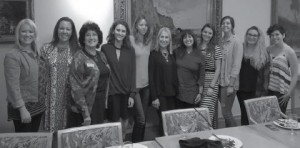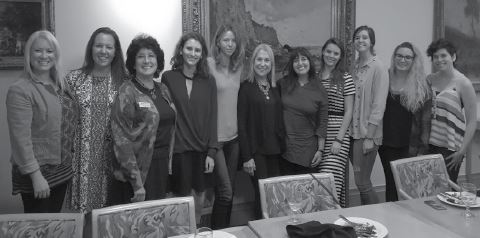 Letty Cottin Pogrebin, a Jewish feminist, journalist, and author, visited campus last Monday and held two events. The first was an intimate dinner with a few students to discuss her life and work, and the second was a talk with former Congresswoman Pat Schroeder and Rollins President Emerita Rita Bornstein, which was open to the public. Pogrebin’s visit was planned by Bornstein and co-sponsored by the Florida League of Women Voters, Sexuality, Women’s and Gender Studies, and Jewish Studies.
Letty Cottin Pogrebin, a Jewish feminist, journalist, and author, visited campus last Monday and held two events. The first was an intimate dinner with a few students to discuss her life and work, and the second was a talk with former Congresswoman Pat Schroeder and Rollins President Emerita Rita Bornstein, which was open to the public. Pogrebin’s visit was planned by Bornstein and co-sponsored by the Florida League of Women Voters, Sexuality, Women’s and Gender Studies, and Jewish Studies.
Pogrebin was a founding editor of Ms. Magazine, which was a landmark publication in the feminism movement. Many of her works revolve around the concepts of Judaism and feminism and how they overlap. She has written a total of eleven books; notable writings include her two memoirs Deborah, Golda, and Me: Being Female and Jewish in America (1992) and Getting Over Getting Older (1997). Also significant are her first novel, called Three Daughters (2003), and a guidebook entitled How To Be A Friend To A Friend Who’s Sick (2014).
Pogrebin’s newest novel is entitled Single Jewish Male Seeking Soul Mate (2015). The plot revolves around a young Jewish man who promises his mother that he will marry a Jewish woman to preserve their bloodline and traditions. After her death, he finds himself falling in love with an African-American activist.
“What is Jewish continuity? That’s the question this book asks,” said Pogrebin at her dinner with students.
Dr. Yudit Greenberg, Cornell Professor of Religion and Director of the Jewish Studies Program, commented on why Pogrebin’s writings are important to her.
“I appreciate and admire Ms. Pogrebin’s writings. She writes with passion and compassion; I am comforted when I read her close description of Jewish life in New York—the foods eaten, the holidays celebrated, the Yiddish phrases strewn throughout her writings. She is the bridge between the old world of Eastern European Jewish immigrants after the turn of the twentieth century and contemporary American Jews who are more fully integrated and part of our multiculturalism,” said Greenberg.
“I think her book Deborah, Golda, and Me: Being Female and Jewish in America has been influential in addressing the mutual interdependence of feminism and Judaism.” Greenberg often uses the book in her class “Jewish Life and Thought.”
Pogrebin commented on how she finds Deborah to be a feminist role model.
“Deborah is a prophet. She’s a military leader, she has a song, she becomes a judge—who could not use this as a role model?”
Her dinner discussion with students was filled with reflections on feminism and religion. Pogrebin spoke of growing up as a young Jewish woman and how she struggled to reconcile her family’s faith with her feminism. She touched on topics such as the Holocaust, Jewish traditions, and her writings.
Greenberg said, “I hope students learned from her about her courage and determination and that of the women of her generation who fiercely labored for justice and equality. . . [and] her struggle to maintain her dual identity as a feminist and a Jew and dedication to both in the face of differences and biases within the feminist movement.”







Be First to Comment